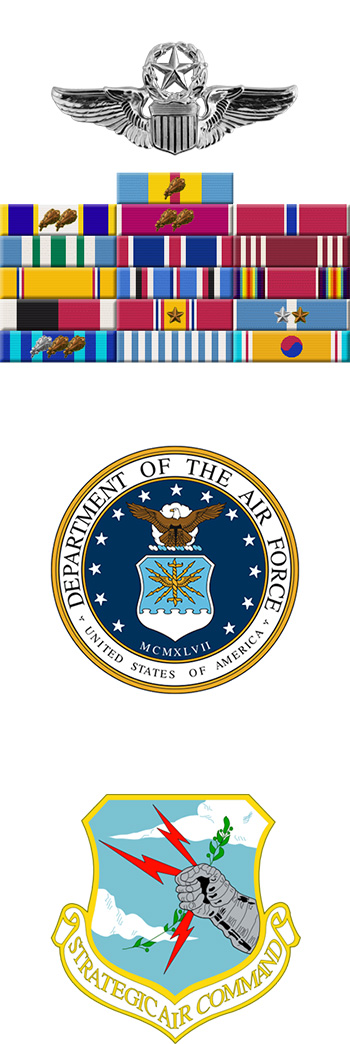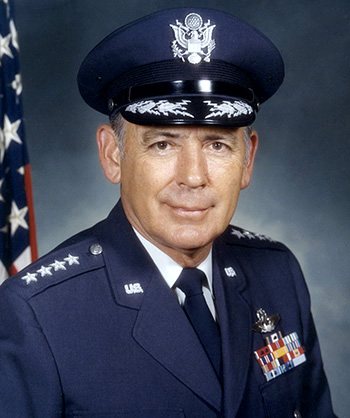
|
Russell E. Dougherty |
 |
|||
| Rank, Service | ||||
General O-10, U.S. Air Force |
||||
| Veteran of: | ||||
|
||||
| Tribute: | ||||
Russell Dougherty was born on November 15, 1920, in Glasgow, Kentucky. He served with the 123rd Cavalry of the Kentucky National Guard from January 25, 1936, to May 1, 1937, and from July 8, 1938, to December 11, 1939. Dougherty served with the Federal Bureau of Investigation for a short time before receiving his bachelor's degree from Western Kentucky State College in 1942. He enlisted in the Aviation Cadet Program of the U.S. Army Air Forces on March 21, 1942, and was commissioned a 2d Lt and awarded his pilot wings on March 25, 1943. Lt Dougherty served as an instructor pilot with Air Training Command and as a B-17 Flying Fortress and B-29 Superfortress instructor pilot with 3rd Air Force until the end of the war, and he left active duty and went into the Air Force Reserve on December 4, 1945. He was recalled to active duty on February 17, 1947, and served as an instructor with the Air Force Reserve at Standiford Field, Kentucky, while completing his Law degree at the University of Louisville. Capt Dougherty served as staff judge advocate for the 19th Bomb Wing and then as assistant staff judge advocate for 20th Air Force in Japan from August 1948 to April 1950, and then as assistant staff judge advocate for Far East Air Forces in Japan from April 1950 to August 1951. During this time he deployed to South Korea numerous times during the Korean War. His next assignment was as Chief of the Appeals and Litigation Division with Air Material Command at Wright-Patterson AFB, Ohio, from August 1951 to December 1952, followed by B-29 refresher training and KC-97 Stratotanker training from December 1952 to June 1953. LtCol Dougherty then served as Operations Officer for the 303rd Air Refueling Squadron, Commander of the 303rd Armament and Electronics Squadron, and then as Commander of the 358th Bomb Squadron at Davis-Monthan AFB, Arizona, from June 1953 to November 1956. Col Dougherty next served as Chief of the Operations Division, Deputy Director and then Director of Operations with Headquarters 15th Air Force at March AFB, California, from November 1956 to July 1959, followed by National War College in Washington, D.C., from July 1959 to June 1960. He served with Headquarters U.S. Air Force in the Pentagon from June 1960 to July 1964, and then as Deputy Director for Plans with Headquarters U.S. European Command in Paris, France, from July 1964 to August 1965. Gen Dougherty next served as Director of the European Region in the Office of the Secretary of Defense for International Security Affairs at the Pentagon from August 1965 to July 1967, followed by service as Director of Plans and Policy with Headquarters U.S. European Command at Stuttgart, West Germany, from July 1967 to August 1969. He served as Assistant Deputy Chief of Staff and then as Chief of Staff for Plans and Operations with Headquarters U.S. Air Force in the Pentagon from August 1969 to April 1971, and then as Commander of 2nd Air Force at Barksdale AFB, Louisiana, from April 1971 to April 1972. His next assignment was as Chief of Staff of Supreme Headquarters Allied Powers Europe from May 1972 to July 1974, and then as the 8th Commander in Chief of Strategic Air Command at Offutt AFB, Nebraska, from August 1, 1974, until his retirement from the Air Force on October 1, 1977. Russell Dougherty died on September 7, 2007, and was buried at Arlington National Cemetery. |
||||
|
||||

